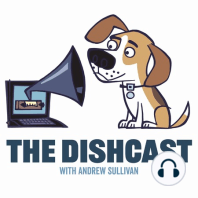105 min listen

Antonio García Martínez On Christianity And The Woke Religion
Antonio García Martínez On Christianity And The Woke Religion
ratings:
Length:
70 minutes
Released:
Sep 24, 2021
Format:
Podcast episode
Description
Antonio is quite the Renaissance man: child of Cuban exiles, journalist, PhD student in physics, Wall Street ace, entrepreneur, Facebook ad pioneer, and Silicon Valley apostate. His NYT bestselling memoir Chaos Monkeys got rave reviews until five years later it got him fired from Apple a few weeks into his job because of a woke revolt. Now he has a brilliant substack. In this episode we dive deep into our Catholic backgrounds, Antonio’s break toward Judaism, and the new Woke religion.You can listen to the episode right away in the audio player embedded above, or right below it you can click “Listen in podcast app” — which will connect you to the Dishcast feed. To listen to two excerpts from my conversation with Antonio — on how he thinks Christianity is flawed compared to his chosen religion of Judaism, and on how the Great Awokening is very Puritan in nature — head over to our YouTube page.A reader reflects on last week’s episode with Ross Douthat:You and Douthat are my two favorite contemporary thinkers, so listening to both of you discuss such a wide range of topics absolutely delighted me. While you two have some commonalities in your respective backgrounds that are obvious — Catholic conservatives educated at Harvard and working in journalism — the fact that you have both endured chronic illnesses never occurred to me. Listening to you discuss the struggle and the pain, and the way that suffering has shaped your respective relationships with God, was very moving. I was surprised by how little of Douthat’s personal spirituality I knew about, despite having read him for over a decade and obviously being very familiar with his overall interest in religion. But you have a wonderful way of getting your interviewees to open up and of empathizing with them, and this interview was no exception.One amusing part of the interview, which underscores the complexity of both thinkers, was your discussion of the political landscape toward the end. I typically consider you to be to Douthat’s left, and in most cases that is true. But it was enjoyable to hear you outflank him to the right on the question of wokeism. Obviously you have different audiences, objectives, and temperaments that shape your writing.I also want to briefly note that I greatly enjoyed the old interview that Johann Hari did of you. Aside from how moving it was to hear you discuss your personal faith journey, it was incredibly engaging to hear you and Hari get into the weeds of political philosophy. Also, amusingly, I immediately picked up on your thicker English accent, which you eventually acknowledged as probable subconscious code-switching.I was in England at the time and the accent creeps back in. A question from a reader:I have a background in Philosophy of Religion, with some familiarity with political philosophy. However, Oakeshott is someone who has only come on to my radar since following you in the last year or two. Could you make a recommendation for where to begin reading him? I realize he apparently evolved in his thinking, but just curious of a good place to start.Read his introduction to Hobbes’ Leviathan. Then the assorted essays in “Rationalism in Politics.” Then try the final third of “On Human Conduct.” For a superb account of Oakeshott on religion (the ultimate focus of my own book on him), try Elizabeth Corey’s study. Another reader points to a sermon in the midst of the Jewish holidays:I love your writing and your defense of liberalism. Along those lines, I thought you might appreciate this impassioned, yet measured, advocacy of liberalism from a religious perspective. It’s the Kol Nidre (night of Yom Kippur — holiest time of the Jewish Year) sermon from the chief rabbi at Central Synagogue in NYC, Angela Warnick Buchdal, who is herself a trailblazer in being an Asian, female rabbi. (As a Catholic, I hope you don’t mind the comparison at the beginning of Judaism to the Nicene Creed; not sure how valid that is). Her measured yet clear repudiation
Released:
Sep 24, 2021
Format:
Podcast episode
Titles in the series (100)
Sam Harris On Trump's Incurable Character, Biden's Flaws and Virtues, The Toll Of Wokeness, And How A Landslide Could Heal Us by The Dishcast with Andrew Sullivan